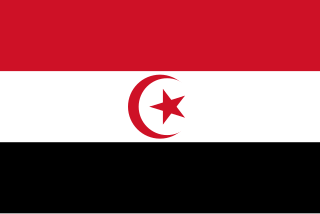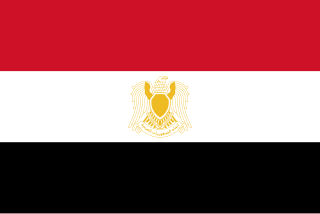Related Research Articles

The United Arab Republic was a sovereign state in the Middle East from 1958 to 1971. It was initially a political union between Egypt and Syria from 1958 until Syria seceded from the union after the 1961 Syrian coup d'état — leaving a rump state. Egypt continued to be known officially as the United Arab Republic until 1971.

Gamal Abdel Nasser Hussein was an Egyptian politician who served as the second President of Egypt from 1954 until his death in 1970. Nasser led the 1952 overthrow of the monarchy and introduced far-reaching land reforms the following year. Following a 1954 attempt on his life by a Muslim Brotherhood member, he cracked down on the organization, put President Mohamed Naguib under house arrest and assumed executive office. He was formally elected president in June 1956.

Muammar Muhammad Abu Minyar al-Gaddafi, commonly known as Colonel Gaddafi, was a Libyan revolutionary, politician and political theorist. He governed Libya as Revolutionary Chairman of the Libyan Arab Republic from 1969 to 1977 and then as the "Brotherly Leader" of the Great Socialist People's Libyan Arab Jamahiriya from 1977 to 2011. He was initially ideologically committed to Arab nationalism and Arab socialism but later ruled according to his own Third International Theory.

The Arab Islamic Republic was a proposed unification of Tunisia and Libya in 1974, agreed upon by Libyan head of state Muammar Gaddafi and Tunisian President Habib Bourguiba. Additional countries—Morocco and Algeria—were later included in the proposal, which was never implemented.

The National Democratic Party was the ruling political party in Egypt from 1978 to 2011. The party was founded by President Anwar El Sadat in 1978.

The Third International Theory was the style of government proposed by Muammar Gaddafi in the early 1970s, on which his government, the Great Socialist People's Libyan Arab Jamahiriya, was officially based. It was partly inspired by Islamic socialism, Arab nationalism, African nationalism and partly by the principles of direct democracy.

The Federation of Arab Republics was an attempt by Muammar Gaddafi to merge Libya, Egypt and Syria in order to create a unified Arab state. Although approved by a referendum in each country on 1 September 1971, the three countries disagreed on the specific terms of the merger. The federation lasted from 1 January 1972 to 19 November 1977.
Abdur Rahman Badawi was an Egyptian existentialist philosopher, professor of philosophy and poet. He has been called the "foremost master of Arab existentialism." He authored more than 150 works, amongst them 75 which were encyclopaedic. He wrote easily in his native Arabic, English, Spanish, French, German and Italian, and read Greek, Latin and Persian.

The Arab Socialist Union Party of Syria (ASU) is a Nasserist political party in Syria. ASU is led by Safwan al-Qudsi. The party was formed in 1973, following a split from the original ASU.
The Arab Union is a proposed concept of a political union of the Arab states. The term was first used when the British Empire promised the Arabs a united independent state in return for revolting against the Ottoman Empire, with whom Britain was at war. It never came to fruition following the Sykes–Picot Agreement. Despite this, many in the Arab world have since called for the creation of a pan-Arab state. Egyptian President Gamal Abdel Nasser made several unsuccessful attempts to unite Egypt with other Arab countries. Similar attempts were made by other Arab leaders, such as Hafez al-Assad, Ahmed Hassan al-Bakr, Faisal I of Iraq, Muammar Gaddafi, Saddam Hussein, Gaafar Nimeiry and Anwar Sadat.

Muammar Gaddafi became the de facto leader of Libya on 1 September 1969 after leading a group of young Libyan military officers against King Idris I in a bloodless coup d'état. After the king had fled the country, the Libyan Revolutionary Command Council (RCC) headed by Gaddafi abolished the monarchy and the old constitution and established the Libyan Arab Republic, with the motto "freedom, socialism and unity".

The Egyptian–Libyan War or the Four Day War was a short border war fought between Libya and Egypt that lasted from 21 to 24 July 1977. The conflict stemmed from a deterioration in relations that had occurred between the two states after Egyptian President Anwar Sadat had rebuffed Libyan leader Muammar Gaddafi's entreaties to unify their countries and had pursued a peace settlement with Israel in the aftermath of the Yom Kippur War of 1973. Soon thereafter Libya began sponsoring dissidents and assassination plots to undermine Sadat, and Egypt responded in kind to weaken Gaddafi. In early 1976 Gaddafi dispatched troops to the Egyptian frontier where they began clashing with border guards. Sadat responded by moving many troops to the area, while the Egyptian General Staff drew up plans for an invasion to depose Gaddafi.

Khaled Mohieddine was an Egyptian politician and a major in the Egyptian Army. He participated in the Egyptian Revolution of 1952, as a member of the Free Officers Movement, which overthrew the monarchy then under the rule of King Farouk.

After the neighboring countries of Egypt and Libya both gained independence in the early 1950s, Egypt–Libya relations were initially cooperative. Libya assisted Egypt in the 1973 Arab-Israeli War. Later, tensions arose due to Egypt's rapprochement with the west. Following the 1977 Libyan–Egyptian War, relations were suspended for twelve years. However, since 1989 relations have steadily improved. With the progressive lifting of UN and US sanctions on Libya from 2003 to 2008, the two countries have been working together to jointly develop their oil and natural gas industries.
The Arab Cold War was a period of political rivalry in the Arab world that occurred as part of the broader Cold War between, approximately, the Egyptian Revolution of 1952 that brought President Gamal Abdel Nasser to power in that country, and the 1979 Iranian Revolution which led Arab-Iranian tensions to eclipse intra-Arab strife. On one side were newly-established nationalist, mostly secular republics, led by Nasser's Egypt, and on the other side were traditionalist monarchies led by King Faisal of Saudi Arabia.

The Arab Socialist Union was an Egyptian political party based on the principles of Nasserist Arab socialism.

Hikmat Abu Zayd was an Egyptian politician and academic. She became the first female cabinet minister in Egypt in 1962. Her tenure as minister of social affairs set a precedent. Afterwards, it became common for women to head that ministry. An avowed advocate of Nasserism, Abu Zayd has had a major impact on Egyptian law and policy in the areas of social affairs and insurance.

The Iraqi Arab Socialist Union was an Iraqi political party based on the principles of Nasserist Arab socialism. It was a sister party to the Arab Socialist Union parties that formed in other Arab countries.

Diaa al-Din Dawoud was an Egyptian politician and activist. He is the founder of the Arab Democratic Nasserist Party, serving as its secretary-general between 1992 and November 2010.
In March 1972, Ba'athist Iraq proposed to Egypt and Syria a re-establishment of the United Arab Republic, which broke apart in 1971. The Iraqi proposal was an immediate reaction to Jordan's proposal for a United Arab Kingdom but collided with the already established Federation of Arab Republics and failed because of Iraqi–Syrian differences.
References
- ↑ Political Culture in Libya. Routledge. 5 September 2013. p. 46. ISBN 9781136115868.
- ↑ Cairo Press Review. 21 June 1973. p. 26.
- ↑ "Libya - The Arab Socialist Union". countrystudies.us. Retrieved 2021-06-02.
- ↑ Cairo Press Review , 1972. p. 11
- ↑ The Middle East: Abstracts and index , Vol. 23, Part 2. Library Information and Research Service., 1999. p. 248